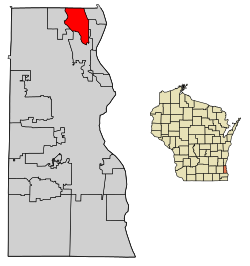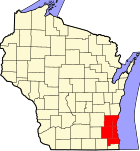Village in Wisconsin, United States
| River Hills, Wisconsin | |
|---|---|
| Village | |
 Location of River Hills in Milwaukee County, Wisconsin. Location of River Hills in Milwaukee County, Wisconsin. | |
| Coordinates: 43°9′55″N 87°55′57″W / 43.16528°N 87.93250°W / 43.16528; -87.93250 | |
| Country | |
| State | |
| County | Milwaukee |
| Incorporated | 1930; 95 years ago (1930) |
| Area | |
| • Total | 5.33 sq mi (13.81 km) |
| • Land | 5.16 sq mi (13.35 km) |
| • Water | 0.17 sq mi (0.45 km) |
| Elevation | 709 ft (216 m) |
| Population | |
| • Total | 1,602 |
| • Density | 305.47/sq mi (117.95/km) |
| Time zone | UTC-6 (Central (CST)) |
| • Summer (DST) | UTC-5 (CDT) |
| Area code | 414 |
| FIPS code | 55-68325 |
| GNIS feature ID | 1572350 |
| Website | www |
River Hills is a village in Milwaukee County, Wisconsin, United States. The population was 1,602 at the 2020 census. A suburb of Milwaukee, it is part of the Milwaukee metropolitan area.
History
In the early 19th century, the River Hills area was controlled by Native Americans, including the Menominee, Potawatomi, and Sauk people. The Menominee surrendered the land east of the Milwaukee River to the United States Federal Government through the Treaty of Washington in 1832. In 1833, the Potawatomi surrendered the land west of the river by signing the 1833 Treaty of Chicago, which (after being ratified in 1835) required them to leave Wisconsin by 1838. The land was organized as part of the Town of Milwaukee in 1835, and much of the land was bought by land speculators, who cleared the old-growth forests for timber. The first permanent white settlers were Joel and Cephas Buttles. The latter owned 160 acres in River Hills and built a cabin in 1843. In the mid-1840s, many families of Dutch settlers began arriving in the Town of Milwaukee to farm the land, but by the 1870s most of the residents were German farmers. The community was primarily agricultural until the 1920s.
In 1911, the Milwaukee Country Club relocated from Shorewood to a site on the western bank of the Milwaukee River in present-day River Hills. The club includes a golf course, and also organized polo matches fox hunts as late as the 1960s. In the 1920s, many wealthy Milwaukee families built summer estates on multi-acre plots near the county club, which served as the community's social center. The wealthy residents were often at odds with the neighboring farms of the Town of Milwaukee, and in 1930 they incorporated River Hills as a village with carefully crafted zoning laws, requiring that houses be built on lots at least one acre in size and banning commercial and industrial from the municipal boundaries. River Hills is the only community in Milwaukee County that is zoned one-hundred percent residential, and eighty-five percent of residential lots are over five acres. The only properties that are not private residences are the country club, the Lynden Sculpture Garden, several churches and synagogues, a public elementary school, and the campus of the private University School of Milwaukee. From 1956 until 1971, the village was also home to a Nike missile silo.
Geography
River Hills is located at 43°9′55″N 87°55′57″W / 43.16528°N 87.93250°W / 43.16528; -87.93250 (43.165142, -87.932566).
According to the United States Census Bureau, the village has a total area of 5.31 square miles (13.75 km), of which, 5.13 square miles (13.29 km) of it is land and 0.18 square miles (0.47 km) is water.
Demographics
| Census | Pop. | Note | %± |
|---|---|---|---|
| 1940 | 541 | — | |
| 1950 | 567 | 4.8% | |
| 1960 | 1,257 | 121.7% | |
| 1970 | 1,561 | 24.2% | |
| 1980 | 1,642 | 5.2% | |
| 1990 | 1,612 | −1.8% | |
| 2000 | 1,631 | 1.2% | |
| 2010 | 1,597 | −2.1% | |
| 2020 | 1,602 | 0.3% | |
| U.S. Decennial Census | |||
2010 census
As of the census of 2010, there were 1,597 people, 595 households, and 492 families living in the village. The population density was 311.3 inhabitants per square mile (120.2/km). There were 647 housing units at an average density of 126.1 per square mile (48.7/km). The racial makeup of the village was 82.3% White, 6.3% African American, 0.3% Native American, 7.5% Asian, 1.0% from other races, and 2.7% from two or more races. Hispanic or Latino of any race were 4.1% of the population.
There were 595 households, of which 32.6% had children under the age of 18 living with them, 74.6% were married couples living together, 5.4% had a female householder with no husband present, 2.7% had a male householder with no wife present, and 17.3% were non-families. 15.3% of all households were made up of individuals, and 6.7% had someone living alone who was 65 years of age or older. The average household size was 2.68 and the average family size was 2.97.
The median age in the village was 49.5 years. 24% of residents were under the age of 18; 4.5% were between the ages of 18 and 24; 14% were from 25 to 44; 38.5% were from 45 to 64; and 19.1% were 65 years of age or older. The gender makeup of the village was 48.7% male and 51.3% female.
2000 census
As of the census of 2000, there were 1,631 people, 590 households, and 493 families living in the village. The population density was 320.3 people per square mile (123.7/km). There were 617 housing units at an average density of 121.2 per square mile (46.8/km). The racial makeup of the village was 85.71% White, 4.90% African American, 0.12% Native American, 7.54% Asian, 0.06% from other races, and 1.66% from two or more races. Hispanic or Latino of any race were 2.08% of the population.
There were 590 households, out of which 33.4% had children under the age of 18 living with them, 77.8% were married couples living together, 3.7% had a female householder with no husband present, and 16.3% were non-families. 12.7% of all households were made up of individuals, and 4.7% had someone living alone who was 65 years of age or older. The average household size was 2.76 and the average family size was 3.02.
In the village, the population was spread out, with 24.5% under the age of 18, 4.8% from 18 to 24, 18.8% from 25 to 44, 37.0% from 45 to 64, and 14.8% who were 65 years of age or older. The median age was 46 years. For every 100 females, there were 100.9 males. For every 100 females age 18 and over, there were 99.2 males.
The median income for a household in the village was $161,292, and the median income for a family was $181,443, but the central regions of River Hills tend to be much wealthier than the outlying regions. Males had a median income of $100,000 versus $54,167 for females. The per capita income for the village was $94,479. About 0.4% of families and 1.7% of the population were below the poverty line, including 1.3% of those under age 18 and 1.3% of those age 65 or over.
Notable resident
Giannis Antetokounmpo, NBA player for the Milwaukee Bucks
References
- "2019 U.S. Gazetteer Files". United States Census Bureau. Retrieved August 7, 2020.
- ^ "US Board on Geographic Names". United States Geological Survey. October 25, 2007. Retrieved January 31, 2008.
- ^ "U.S. Census website". United States Census Bureau. Retrieved November 18, 2012.
- ^ "U.S. Census website". United States Census Bureau. Retrieved January 31, 2008.
- "Population and Housing Unit Estimates". United States Census Bureau. May 24, 2020. Retrieved May 27, 2020.
- ^ "Fox Point: A Planned Village". Village of Fox Point. 1976. Retrieved January 1, 2021.
- Gerwing, Anselm J. (Summer 1964). "The Chicago Indian Treaty of 1833". Journal of the Illinois State Historical Society. 57 (2): 117–142. ISSN 0019-2287. JSTOR 40190019.
- "Potawatomi History". Milwaukee Public Museum. Retrieved February 20, 2020.
- ^ "Encyclopedia of Milwaukee: Village of River Hills". University of Wisconsin-Milwaukee. Retrieved January 1, 2021.
- "US Gazetteer files: 2010, 2000, and 1990". United States Census Bureau. February 12, 2011. Retrieved April 23, 2011.
- "US Gazetteer files 2010". United States Census Bureau. Archived from the original on January 25, 2012. Retrieved November 18, 2012.
- "Census of Population and Housing". Census.gov. Retrieved June 4, 2015.
- "Giannis Antetokounmpo has a new mansion in River Hills [PHOTOS]".
External links
| Places adjacent to River Hills, Wisconsin | ||||||||||||||||
|---|---|---|---|---|---|---|---|---|---|---|---|---|---|---|---|---|
| ||||||||||||||||
| Municipalities and communities of Milwaukee County, Wisconsin, United States | ||
|---|---|---|
| County seat: Milwaukee | ||
| Cities |  | |
| Villages | ||
| Former communities | ||
| Indian reservation | Forest County Potawatomi Community‡ | |
| Footnotes | ‡This populated place also has portions in another county or counties | |
| Milwaukee metropolitan area | ||
|---|---|---|
| Central city |  | |
| Largest municipalities (over 25,000 in 2010) | ||
| Municipalities (over 10,000 in 2010) | ||
| Smaller municipalities (under 10,000 in 2010) |
| |
| Counties | ||
| Other topics | ||
| Notes: village town city | ||